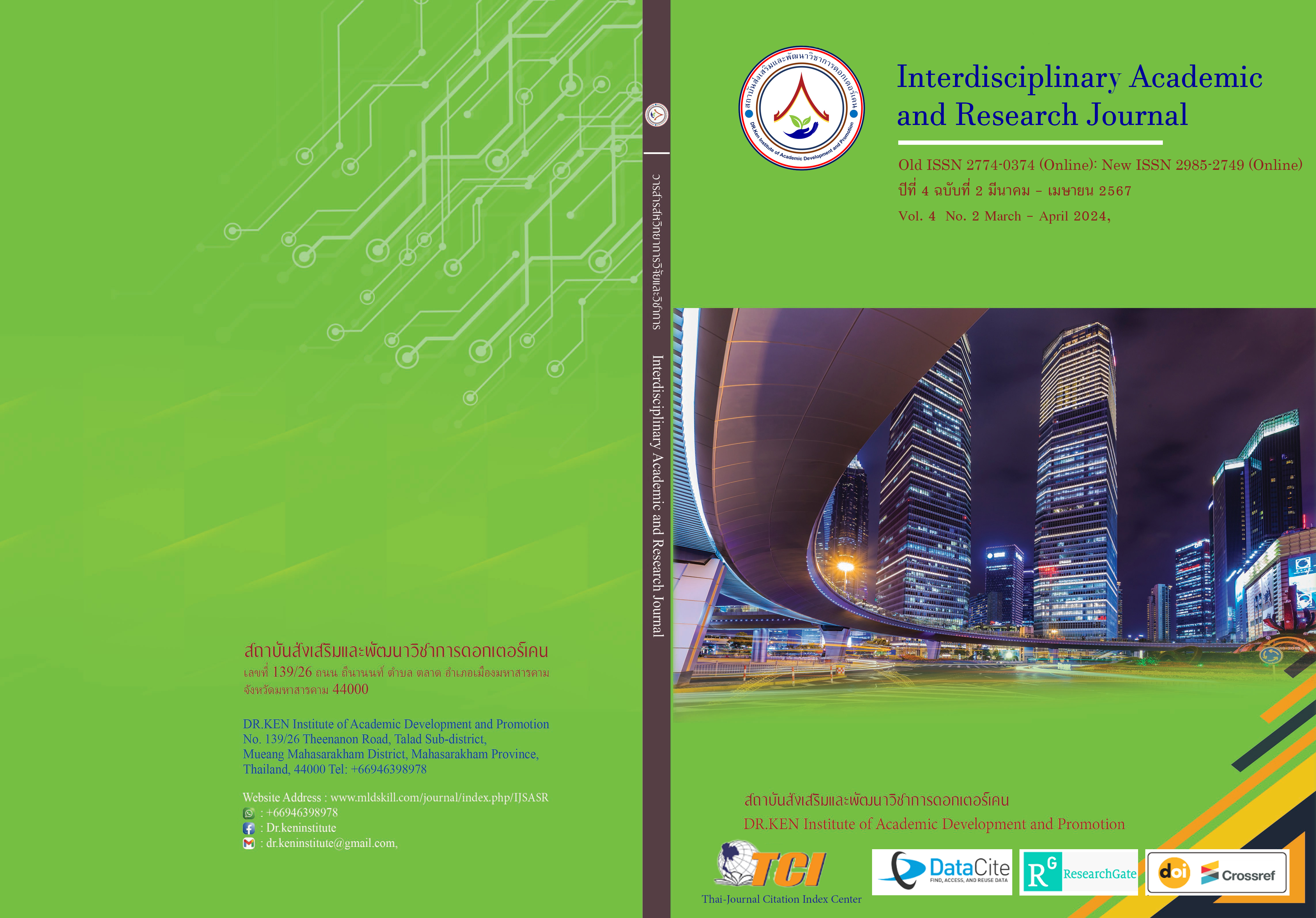Developing Early Childhood Emotional Intelligence by Organizing Storytelling Activities Accompanying Open-Ended Questions
DOI:
https://doi.org/10.60027/iarj.2024.274887Keywords:
Emotional Intelligence; , Organizing Storytelling Activities Accompanying Open-Ended Questions; , Rhythmic Pacing StudentAbstract
Background and Aims: Early childhood emotional intelligence is a result of the child's experiences in the environment. Storytelling is a simple form of recreation that satisfies the natural needs of humans, allows for mutual learning, and can take listeners into a world of imagination. The listener will find something new and fun to temporarily escape from the monotony of everyday life. Sometimes stories help explain various phenomena that occur in the world. Developing the emotional intelligence of early childhood children by organizing storytelling activities with open-ended questions. The objective was to compare the emotional intelligence of early childhood children before and after organizing storytelling activities with open-ended questions.
Methodology: The sample group includes 15 early childhood children aged 5-6 years who are studying in Kindergarten 3, Semester 1, Academic Year 2023, Guangxi Kindergarten School, Guangxi Province, China, obtained by purposive sampling. The tools used in the research include: There were 8 plans for organizing storytelling activities with open-ended questions. The suitability of the plans was at the most appropriate level and the early childhood emotional intelligence assessment form had 10 questions. The consistency value was 0.80-1.00. Statistics used in the analysis Data includes mean, and standard deviation.
Results: the research results found that Early childhood children after receiving the storytelling activity with open-ended questions had higher emotional intelligence than before the activity.
Conclusion: the value of stories will help enhance development in various areas. Especially promoting emotional intelligence very well. Therefore, when teachers tell stories, they should ask open-ended questions and allow children to think of multiple answers, which will have a great impact on the emotional intelligence of early childhood.
References
กรมสุขภาพจิต กระทรวงสาธารณสุข. (2545). คู่มือความฉลาดทางอารมณ์. กรุงเทพฯ: ศูนย์สารนิเทศและประชาสัมพันธ์กรมสุขภาพจิต.
กระทรวงศึกษาธิการ. (2560). หลักสูตรการศึกษาปฐมวัย พุทธศักราช 2560. สำนักวิชาการและมาตรฐานการศึกษา สำนักงานคณะกรรมการการศึกษาขั้นพื้นฐาน กระทรวงศึกษาธิการ. กรุงเทพฯ : โรงพิมพ์ชุมนุมสหกรณ์การเกษตรแห่งประเทศไทย จำกัด.
กระทรวงสาธารณสุข. (2561). คู่มือกิจกรรมทางกายและการจัดสภาพแวดล้อม. กิจกรรมทางกายเพื่อสุขภาพ กรมอนามัย. นนทบุรี: โรงพิมพ์ชุมชนสหกรณ์การเกษตรแห่งประเทศไทย.
เกริก ยุ้นพันธ์. (2539). การเล่านิทาน. กรุงเทพมหานคร: สุวีริยาสาส์น.
จิตตินันท์ บุญสถิรกุล. (2558). การเรียนรู้ทางอารมณ์และสังคมกับการพัฒนาทักษะชีวิตเด็กปฐมวัย. ใน เอกสารการสอนชุดวิชาการพัฒนาทักษะชีวิตสำหรับเด็กปฐมวัย หน่วยที่ 3 (น. 3-1 ถึง 3-42). นนทบุรี: สำนักพิมพ์มหาวิทยาลัยสุโขทัยธรรมาธิราช.
ชญานนท์ สุวรรณเพชร. (2564). การพัฒนาความฉลาดทางอารมณ์ของเด็กปฐมวัยโดยใช้กิจกรรมทางกายประสานการชี้แนะ. วารสารมหาวิทยาลัยราชภัฎร้อยเอ็ด, 17(1), 180-192.
ชนาธิป บุบผามาศ. (2553). การคิดเชิงเหตุผลของเด็กปฐมวัยที่ได้รับการจัดกิจกรรมการเล่านิทานอีสปประกอบคำถาม. ปริญญานิพนธ์การศึกษามหาบัณฑิต: มหาวิทยาลัยศรีนครินทรวิโรฒ.
ชัยวัฒน์ สุทธิรัตน์. (2553). การจัดการเรียนรู้แนวใหม่. นนทบุรี: สหมิตรพริ้นติ้งแอนด์พับลิสชิ่ง.
ทิศนา แขมมณี. (2550). ศาสตร์การสอน: องค์ความรู้เพื่อจัดกระบวนการเรียนรู้ที่มีประสิทธิภาพ. กรุงเทพฯ : ด่านสุทธาการพิมพ์.
บังอร เนตรทอง. (2555). ผลการจัดกิจกรรมการเล่านิทานที่มีต่อความฉลาดทางอารมณ์ของเด็กปฐมวัย โรงเรียนบ้านเขาล้อ จังหวัดนครสวรรค์. การศึกษาค้นคว้าอิสระ ศศ.ม. (หลักสูตรและการสอน). นนทบุรี : มหาวิทยาลัยสุโขทัยธรรมาธิราช.
บุษบารัตน์ ศรีนวลไสว. (2553). การพัฒนาความฉลาดทางอารมณ์ของเด็กปฐมวัยโดยใช้หนังสือนิทานประกอบภาพ. วิทยานิพนธ์ กศ.ม. มหาวิทยาลัยมหาสารคาม. มหาสารคาม.
ประจักษ์ บุตรแก้ว. (2557). ผลของการจัดกิจกรรมการเล่านิทานประกอบคําถามปลายเปิดที่มีต่อความสามารถทางคณิตศาสตร์ด้านการวิเคราะห์ข้อมูลของเด็กปฐมวัย. ภาคนิพนธ์ ค.ม. ปทุมธานี : มหาวิทยาลัยราชภัฏวไลยอลงกรณ์ ในพระบรมราชูปถัมภ์.
ไพศาล วรคำ. (2562). การวิจัยทางการศึกษา. มหาสารคาม : ตักสิลาการพิมพ์.
วัฒนา ปุญญฤทธิ์. (2557). หน่วยที่ 9 การประเมินและการเสริมสร้างพฤติกรรมทางด้านอารมณ์–จิตใจของเด็กปฐมวัย. นนทบุรี: สำนักพิมพ์มหาวิทยาลัยสุโขทัยธรรมาธิราช.
วาโร เพ็งสวัสดิ์ (2542). การวิจัยทางการศึกษาปฐมวัย. สกลนคร : คณะครุศาสตร สถาบัน. ราชภัฏสกลนคร.
วาโร เพ็งสวัสดิ์ (2544). การวิจัยการศึกษาปฐมวัย. กรุงเทพฯ: สุวีริยาสาสน.
วิทยาธร ท่อแก้ว. เทคนิคการตั้งคําถามและการตอบ. วารสารมาลาเรีย. 35(1), 28-31
สมศักดิ์ ปริปุรณะ. (2542). นิทานความสำคัญและประโยชน์. ราชบุรี : สถาบันราชภัฎหมู่บ้านจอมบึง.
สมศักดิ์ สินธุระเวชญ์. (2542). มุ่งสู่คุณภาพการศึกษา. กรุงเทพฯ. ไทยวัฒนาพานิช.
Gardner, H. (1993). Multiple intelligences: The theory in practice. Basic Books/Hachette Book Group.
Goleman, D. (1998). Working with Emotional Intelligence. New York: Bantam Books.
Downloads
Published
How to Cite
Issue
Section
License
Copyright (c) 2024 Interdisciplinary Academic and Research Journal

This work is licensed under a Creative Commons Attribution-NonCommercial-NoDerivatives 4.0 International License.
Copyright on any article in the Interdisciplinary Academic and Research Journal is retained by the author(s) under the under the Creative Commons Attribution-NonCommercial-NoDerivatives 4.0 International License. Permission to use text, content, images, etc. of publication. Any user to read, download, copy, distribute, print, search, or link to the full texts of articles, crawl them for indexing, pass them as data to software, or use them for any other lawful purpose. But do not use it for commercial use or with the intent to benefit any business.
















.png)


